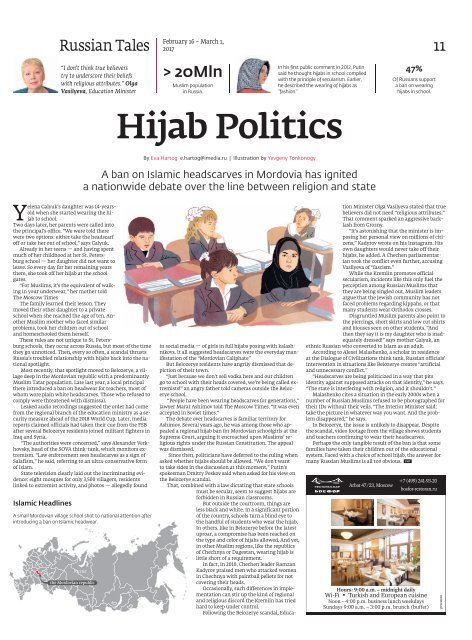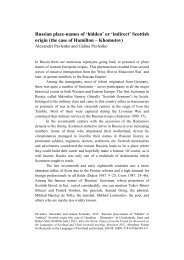What A Drag
ce6228a6226c4f98a7276c749b46a9d7
ce6228a6226c4f98a7276c749b46a9d7
You also want an ePaper? Increase the reach of your titles
YUMPU automatically turns print PDFs into web optimized ePapers that Google loves.
Russian Tales<br />
February 16 – March 1,<br />
2017 11<br />
“I don’t think true believers<br />
try to underscore their beliefs<br />
with religious attributes.” Olga<br />
Vasilyeva, Education Minister<br />
> 20Mln<br />
Muslim population<br />
in Russia.<br />
In his first public comment in 2012, Putin<br />
said he thought hijabs in school complied<br />
with the principle of secularism. Earlier,<br />
he described the wearing of hijabs as<br />
“fashion.”<br />
47%<br />
Of Russians support<br />
a ban on wearing<br />
hijabs in school.<br />
Hijab Politics<br />
By Eva Hartog e.hartog@imedia.ru | Illustration by Yevgeny Tonkonogy<br />
A ban on Islamic headscarves in Mordovia has ignited<br />
a nationwide debate over the line between religion and state<br />
Yelena Galyuk’s daughter was 14-yearsold<br />
when she started wearing the hijab<br />
to school.<br />
Two days later, her parents were called into<br />
the principal’s office. “We were told there<br />
were two options: either take the headscarf<br />
off or take her out of school,” says Galyuk.<br />
Already in her teens — and having spent<br />
much of her childhood at her St. Petersburg<br />
school — her daughter did not want to<br />
leave. So every day for her remaining years<br />
there, she took off her hijab at the school<br />
gates.<br />
“For Muslims, it’s the equivalent of walking<br />
in your underwear,” her mother told<br />
The Moscow Times<br />
The family learned their lesson. They<br />
moved their other daughter to a private<br />
school when she reached the age of ten. Another<br />
Muslim mother who faced similar<br />
problems, took her children out of school<br />
and homeschooled them herself.<br />
These rules are not unique to St. Petersburg<br />
schools, they occur across Russia, but most of the time<br />
they go unnoticed. Then, every so often, a scandal thrusts<br />
Russia’s troubled relationship with hijabs back into the national<br />
spotlight.<br />
Most recently, that spotlight moved to Belozerye, a village<br />
deep in the Mordovian republic with a predominantly<br />
Muslim Tatar population. Late last year, a local principal<br />
there introduced a ban on headwear for teachers, most of<br />
whom wore plain white headscarves. Those who refused to<br />
comply were threatened with dismissal.<br />
Leaked audio recordings suggested the order had come<br />
from the regional branch of the education ministry as a security<br />
measure ahead of the 2018 World Cup. Later, media<br />
reports claimed officials had taken their cue from the FSB<br />
after several Belozerye residents joined militant fighters in<br />
Iraq and Syria.<br />
“The authorities were concerned,” says Alexander Verkhovsky,<br />
head of the SOVA think-tank, which monitors extremism.<br />
“Law enforcement sees headscarves as a sign of<br />
Salafism,” he said, referring to an ultra-conservative form<br />
of Islam.<br />
State television clearly laid out the incriminating evidence:<br />
eight mosques for only 3,500 villagers, residents<br />
linked to extremist activity, and photos — allegedly found<br />
Islamic Headlines<br />
A small Mordovian village school shot to national attention after<br />
introducing a ban on Islamic headwear.<br />
Russia<br />
the Mordovian republic<br />
in social media — of girls in full hijabs posing with kalashnikovs.<br />
It all suggested headscarves were the everyday manifestation<br />
of the “Mordovian Caliphate”<br />
But Belozerye residents have angrily dismissed that depiction<br />
of their town.<br />
“Just because we don’t sell vodka here and our children<br />
go to school with their heads covered, we’re being called extremists!”<br />
an angry father told cameras outside the Belozerye<br />
school.<br />
“People have been wearing headscarves for generations,”<br />
lawyer Marat Ashimov told The Moscow Times. “It was even<br />
accepted in Soviet times.”<br />
The debate over headscarves is familiar territory for<br />
Ashimov. Several years ago, he was among those who appealed<br />
a regional hijab ban for Mordovian schoolgirls at the<br />
Supreme Court, arguing it encroached upon Muslims’ religious<br />
rights under the Russian Constitution. The appeal<br />
was dismissed.<br />
Since then, politicians have deferred to the ruling when<br />
asked whether hijabs should be allowed. “We don’t want<br />
to take sides in the discussion at this moment,” Putin’s<br />
spokesman Dmitry Peskov said when asked for his view on<br />
the Belozerye scandal.<br />
That, combined with a law dictating that state schools<br />
must be secular, seem to suggest hijabs are<br />
forbidden in Russian classrooms.<br />
But outside the courtroom, things are<br />
less black and white. In a significant portion<br />
of the country, schools turn a blind eye to<br />
the handful of students who wear the hijab.<br />
In others, like in Belozerye before the latest<br />
uproar, a compromise has been reached on<br />
the type and color of hijabs allowed. And yet,<br />
in other Muslim regions, like the republics<br />
of Chechnya or Dagestan, wearing hijab is<br />
little short of a requirement.<br />
In fact, in 2010, Chechen leader Ramzan<br />
Kadyrov praised men who attacked women<br />
in Chechnya with paintball pellets for not<br />
covering their heads.<br />
Occasionally, such differences in implementation<br />
can stir up the kind of regional<br />
and religious discord the Kremlin has tried<br />
hard to keep under control.<br />
Following the Belozerye scandal, Educa-<br />
tion Minister Olga Vasilyeva stated that true<br />
believers did not need “religious attributes.”<br />
That comment sparked an aggressive backlash<br />
from Grozny.<br />
“It’s astonishing that the minister is imposing<br />
her personal view on millions of citizens,”<br />
Kadyrov wrote on his Instagram. His<br />
own daughters would never take off their<br />
hijabs, he added. A Chechen parliamentarian<br />
took the conflict even further, accusing<br />
Vasilyeva of “fascism.”<br />
While the Kremlin promotes official<br />
secularism, incidents like this only fuel the<br />
perception among Russian Muslims that<br />
they are being singled out. Мuslim leaders<br />
argue that the Jewish community has not<br />
faced problems regarding kippahs, or that<br />
many students wear Orthodox crosses.<br />
Disgruntled Muslim parents also point to<br />
the piercings, short skirts and low cut shirts<br />
and blouses seen on other students. “And<br />
then they say it is my daughter who is inadequately<br />
dressed!” says mother Galyuk, an<br />
ethnic Russian who converted to Islam as an adult.<br />
According to Alexei Malashenko, a scholar in residence<br />
at the Dialogue of Civilizations think tank, Russian officials’<br />
intervention in situations like Belozerye creates “artificial<br />
and unnecessary conflict.”<br />
“Headscarves are being politicized in a way that pits<br />
identity against supposed attacks on that identity,” he says.<br />
“The state is interfering with religion, and it shouldn’t.”<br />
Malashenko cites a situation in the early 2000s when a<br />
number of Russian Muslims refused to be photographed for<br />
their IDs without their veils. “The Interior Minister said:<br />
take the picture in whatever way you want. And the problem<br />
disappeared,” he says.<br />
In Belozerye, the issue is unlikely to disappear. Despite<br />
the scandal, video footage from the village shows students<br />
and teachers continuing to wear their headscarves.<br />
Perhaps the only tangible result of the ban is that some<br />
families have taken their children out of the educational<br />
system. Faced with a choice of school hijab, the answer for<br />
many Russian Muslims is all too obvious. TMT



